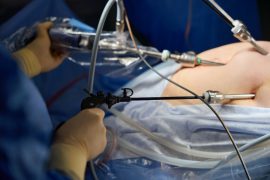The study says, India, with 41 million obese people, ranks third after the US and China in having the highest number of overweight people in the world. Together, India and China represent 15% of the world’s obese population which leads to the rise of the weight loss industry in the country like never before. And, so as the number of weight loss surgery. Obesity can be considered a modern-day epidemic that’s slowly spreading all over the world that includes the young as well as the old. However, the problem with obese people is not just about the excessive fat but the condition that invites a lot of life-threatening diseases like diabetes, stroke, blood pressure, etc. The common treatment for obesity includes losing weight through healthy eating, regular exercising and being more active but who have extreme obesity are advised treatment options like weight loss device, weight loss medicines, or weight loss surgery.
Weight loss surgery is one of the fastest-growing segments of the surgical discipline. Gastric bypass and other weight-loss surgeries — known collectively as bariatric surgery — involve making changes to your digestive tract that aids in losing weight. However, bariatric surgery is not for everyone who is extremely overweight as it has some risks and complications. You may need to meet some medical guidelines and have an extensive screening process to qualify for bariatric surgery. Let’s dig in a dip to understand the risks and side effects associated.
Risks and side effects of Bariatric Surgery
Risks and side effects are part of any surgery or treatment. As evident with any major surgery, bariatric surgery is no exception and this procedure too has its own set of risks and side effects in the short- and long-term. Up to 40% of patients suffer from side-effects post-bariatric surgery. However, serious complications are seen in <5% of patients.
The most usual risks associated with bariatric surgery include:
- Constipation
- Too much internal bleeding
- Infection
- Blood clot formation
- Trouble in breathing
- Gastrointestinal Leaks, after surgery, there is a small chance that food could leak out into your stomach
- In rare cases, Death



Longer-term risks and complications of bariatric surgery include:
- Obstruction of bowels, a gastrointestinal condition in which digested material is prevented from passing normally through the bowel.
- Stone in the gall bladder
- Hernia
- Low blood sugar
- Low nutrition
- Ulcer formation
- Vomiting and Nausea
- GERD or Acid reflux occurs when stomach acid frequently flows back into the tube connecting your mouth and stomach
- Dumping syndrome- It is a group of symptoms, such as diarrhea, nausea, and feeling light-headed or tired after a meal, that is caused by rapid gastric emptying. Rapid gastric emptying is a condition in which food moves too quickly from your stomach to your duodenum.
Unavoidable conditions, emergencies, or under some special circumstances, weight loss surgery or bariatric surgery could only be the treatment option. Though some complications are inevitable, with proper guidance from the doctor one will be able to overcome the challenges post-surgery.
Recovering from the surgery will be the next important step for the ones undergone the surgery. Below are some important tips to note for a speedy recovery.
Recovery from the bariatric surgery
Recovery in the hospital: After undergoing bariatric surgery, the patients have to spend around 2 to 5 days in the hospital, or longer if complications develop. If the surgery was laparoscopic, you can expect a shorter stay at the hospital. It is normal to experience any tiredness, GI symptoms such as nausea, vomiting, flatulence, loss of hunger, etc. in the immediate days to weeks after surgery. You may feel pain at the surgery site for a few days, but if it is unbearable, you may consult your surgeon, who may prescribe an IV analgesic or an oral pain-killer when you resume taking food through your mouth. Performing simple activities such as walking or even frequently altering position in bed can aid in circulation, seeding the recovery process and prevent any complications. Deep breathing and coughing exercises will also aid in preventing any lung infections.



Recovery at home: Your discharge from the hospital will be decided by your doctor based on your health progress. You will be needed to follow a certain diet and activity restrictions at home after discharge. After you get home, don’t rush into performing all activities at once. Proceed gradually. Also, keep up all follow-up appointments with your doctor regularly.
However, it is possible to not lose enough weight or to regain weight after undergoing any weight loss surgery, even when the procedure works correctly. This weight gain, after the surgery, can happen if you fail to follow the doctor’s recommended lifestyle changes, such as consuming a healthy diet, following regular physical activities and having good sleep.




